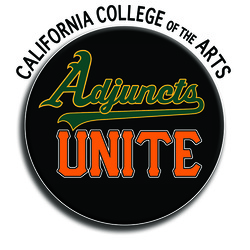
What's this all About?
This spring, contingent faculty (adjuncts, lecturers, and visiting faculty) at Mills College and San Francisco Art Institute voted to unionize with SEIU (The Service Employees International Union) by 78% voting “yes” in their respective union elections. Over the last several months, SEIU have also approached contingent faculty at the California College of the Arts and offered to represent us if we choose to form a union. Because we have many things to consider while we’re thinking about unionizing for collective bargaining rights, we need a public forum like this for clarity. To that end, this website can also serve as a narrative or methodological model for adjuncts at other schools who are considering unionizing. In fact, the inspiration (and much of the language) for this site is taken directly from a similar website produced by SFAI faculty during their union drive.
At CCA, “contingent faculty” includes all of us teaching under such titles as “lecturer”, “senior lecturer”, “adjunct” and “senior adjunct”. In each case, we are hired on a short-term, per-semester basis and our employment is considered “at will” (i.e., we can be fired at any time). Although we are roughly 75 percent of the faculty population at CCA, few, if any, opportunities for health insurance or other benefits exist for contingent faculty. We are held to many of the same standards as our tenured and tenure-track colleagues; yet, we receive a fraction of the same compensation. We must carry advanced degrees in our respective fields, and we are expected to maintain a professional practice as well. Additionally, we are expected to conduct research and perform duties outside of the classroom (although we are not provided with office, studio, or meeting spaces in which such work might be done). While these expectations might not seem unreasonable, it is most certainly unreasonable that we are expected to meet such expectations without any job security and on salaries that do not meet a living wage.
To put things in perspective, the average studio apartment in San Francisco now rents for $2370 per month or more, according to the SF Gate. The average price for artists’ studio space in the San Francisco Bay area is about $650 per month. According to the Living Wage Tool developed at MIT by Dr Amy K. Glasmeier in collaboration with other nationally recognized research institutions, the “living wage” for a single-person household is approximately $24,000 in Alameda County and approximately $26,700 in San Francisco County. According to 2006 US Census Bureau data (the most recent available), the national average income for an individual with a master’s degree is approximately $62,300. By comparison, an adjunct professor at CCA offered only 3 lines of teaching annually makes approximately $19,200.
This has serious consequences for the future of the arts and for education. More and more universities nationwide are relying on under-paid part-time professors for teaching labor. Major news outlets like The Guardian and The New York Times have discussed the problem at length. It has become a national crisis in which promising artists, educators and thinkers everywhere are held back from middle-class life because full-time teaching positions are being replaced by freelance and contingent employment. This places an additional burden on full-time faculty who are increasingly asked to take on additional duties that would have been previously shouldered by a larger full-time faculty body. Additionally, college students (and parents of college students) are paying top dollar for education at elite art schools that barely pay their professors enough to live on, let alone participate in campus life outside of the classroom.
We believe that collective bargaining may be the only route to addressing this broad cultural problem on a national scale as well as within the CCA community. This website is therefore pro-union, but maintains a healthy skepticism for bureaucracy in the tradition of CCA’s artistic community. No union organizers or CCA administration are permitted to contribute to this site; it is for faculty and community only. We are committed to helping contingent faculty achieve a just and sustainable workplace while also maintaining agency and autonomy in the collective bargaining process.
Who Are We?
As stated on the "home" page, we are a group of CCA faculty dedicated to improving the CCA community through unionization. We have been meeting with other faculty, with union organizers, and with faculty from other institutions since February 2014. Although some individuals may be more involved than others in this campaign, we believe there are no "leaders" in this organizing effort. Or, rather, we are all leaders. We believe that the strongest way to move forward is through a horizontal approach that shares responsibility among faculty organizers and fosters an engaged decision-making process. To date, there has not been a single meeting of CCA faculty where a "leader" or "representative" has been elected or otherwise appointed. We encourage you to get involved in making this union live up to your utmost desires.
This spring, contingent faculty (adjuncts, lecturers, and visiting faculty) at Mills College and San Francisco Art Institute voted to unionize with SEIU (The Service Employees International Union) by 78% voting “yes” in their respective union elections. Over the last several months, SEIU have also approached contingent faculty at the California College of the Arts and offered to represent us if we choose to form a union. Because we have many things to consider while we’re thinking about unionizing for collective bargaining rights, we need a public forum like this for clarity. To that end, this website can also serve as a narrative or methodological model for adjuncts at other schools who are considering unionizing. In fact, the inspiration (and much of the language) for this site is taken directly from a similar website produced by SFAI faculty during their union drive.
At CCA, “contingent faculty” includes all of us teaching under such titles as “lecturer”, “senior lecturer”, “adjunct” and “senior adjunct”. In each case, we are hired on a short-term, per-semester basis and our employment is considered “at will” (i.e., we can be fired at any time). Although we are roughly 75 percent of the faculty population at CCA, few, if any, opportunities for health insurance or other benefits exist for contingent faculty. We are held to many of the same standards as our tenured and tenure-track colleagues; yet, we receive a fraction of the same compensation. We must carry advanced degrees in our respective fields, and we are expected to maintain a professional practice as well. Additionally, we are expected to conduct research and perform duties outside of the classroom (although we are not provided with office, studio, or meeting spaces in which such work might be done). While these expectations might not seem unreasonable, it is most certainly unreasonable that we are expected to meet such expectations without any job security and on salaries that do not meet a living wage.
To put things in perspective, the average studio apartment in San Francisco now rents for $2370 per month or more, according to the SF Gate. The average price for artists’ studio space in the San Francisco Bay area is about $650 per month. According to the Living Wage Tool developed at MIT by Dr Amy K. Glasmeier in collaboration with other nationally recognized research institutions, the “living wage” for a single-person household is approximately $24,000 in Alameda County and approximately $26,700 in San Francisco County. According to 2006 US Census Bureau data (the most recent available), the national average income for an individual with a master’s degree is approximately $62,300. By comparison, an adjunct professor at CCA offered only 3 lines of teaching annually makes approximately $19,200.
This has serious consequences for the future of the arts and for education. More and more universities nationwide are relying on under-paid part-time professors for teaching labor. Major news outlets like The Guardian and The New York Times have discussed the problem at length. It has become a national crisis in which promising artists, educators and thinkers everywhere are held back from middle-class life because full-time teaching positions are being replaced by freelance and contingent employment. This places an additional burden on full-time faculty who are increasingly asked to take on additional duties that would have been previously shouldered by a larger full-time faculty body. Additionally, college students (and parents of college students) are paying top dollar for education at elite art schools that barely pay their professors enough to live on, let alone participate in campus life outside of the classroom.
We believe that collective bargaining may be the only route to addressing this broad cultural problem on a national scale as well as within the CCA community. This website is therefore pro-union, but maintains a healthy skepticism for bureaucracy in the tradition of CCA’s artistic community. No union organizers or CCA administration are permitted to contribute to this site; it is for faculty and community only. We are committed to helping contingent faculty achieve a just and sustainable workplace while also maintaining agency and autonomy in the collective bargaining process.
Who Are We?
As stated on the "home" page, we are a group of CCA faculty dedicated to improving the CCA community through unionization. We have been meeting with other faculty, with union organizers, and with faculty from other institutions since February 2014. Although some individuals may be more involved than others in this campaign, we believe there are no "leaders" in this organizing effort. Or, rather, we are all leaders. We believe that the strongest way to move forward is through a horizontal approach that shares responsibility among faculty organizers and fosters an engaged decision-making process. To date, there has not been a single meeting of CCA faculty where a "leader" or "representative" has been elected or otherwise appointed. We encourage you to get involved in making this union live up to your utmost desires.


